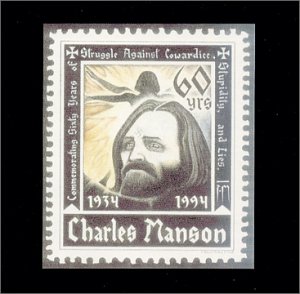
- Format: MP3

Outside of whatever historical interest this record may have (pre-Sharon Tate murder), it is the work of a man who was as good a singer/songwriter as he was a human being. Don't bother.
A living, walking example of the hippie dream gone terribly awry, before Manson and his family went on the killing spree that virtually undermined and eventually destroyed the peaceful atmosphere of the Southern California community, the fledgling musician tried several times unsuccessfully to land a recording contract.
First venturing to California in the mid '50s, Manson soon found himself serving yet another stint in prison (by age 30 he had lived half of his life behind bars). But, after a time spent living in Washington state, Manson arrived in Southern California in 1967 in hopes of becoming a hippie singer-songwriter. Settling in Topanga Canyon, the quasi prophet met several of L.A.'s most prominent musicians including Neil Young, Dennis Wilson and Doris Day's son, producer Terry Melcher. The very idea that someone like Manson was fraternizing with a Beach Boy and the son of Doris Day is indicative of the blurred reality that existed in Southern California at the time. Yet, though his music and views are easily dismissable today, at the time several people in the community, including Neil Young, believed in Manson enough to try and secure him a record contract. Throughout 1968 Manson made demo tapes with Gregg Jakobson and Terry Melcher and, with the influence of Dennis Wilson, came close to inking a deal with Brother Records, the imprint of the Beach Boys. In fact, the group reworked Manson's "Cease To Exist," re-titling it "Never Learn Not to Love" and included it on their 20/20 LP. By 1969, however, Manson and his family of hippie outcasts had suitably scared away any potential recording contracts with their increasingly disturbing behavior and Manson never released an album of his work as a free man.
After his arrest, however, the impending media blitz of the trial created interest in Manson's music, albeit for somewhat dubious reasons, and fringe labels such as Performance and White Devil released his albums such as Lie and Commemoration. Manson also saw one of his songs recorded by the biggest rock n' roll band in the world at that time when Guns n' Roses included a poorly recieved Manson composition on their 1993 covers album, the Spaghetti Incident?